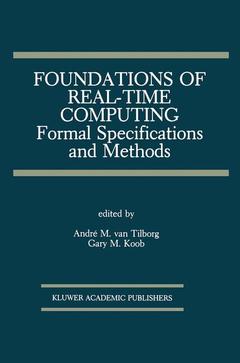Foundations of Real-Time Computing: Formal Specifications and Methods, Softcover reprint of the original 1st ed. 1991 The Springer International Series in Engineering and Computer Science Series, Vol. 142
Langue : Anglais
Coordonnateurs : van Tilborg André M., Koob Gary M.

This volume contains a selection of papers that focus on the state-of the-art in formal specification and verification of real-time computing systems. Preliminary versions of these papers were presented at a workshop on the foundations of real-time computing sponsored by the Office of Naval Research in October, 1990 in Washington, D. C. A companion volume by the title Foundations of Real-Time Computing: Scheduling and Resource Management complements this hook by addressing many of the recently devised techniques and approaches for scheduling tasks and managing resources in real-time systems. Together, these two texts provide a comprehensive snapshot of current insights into the process of designing and building real time computing systems on a scientific basis. The notion of real-time system has alternative interpretations, not all of which are intended usages in this collection of papers. Different communities of researchers variously use the term real-time to refer to either very fast computing, or immediate on-line data acquisition, or deadline-driven computing. This text is concerned with the formal specification and verification of computer software and systems whose correct performance is dependent on carefully orchestrated interactions with time, e. g. , meeting deadlines and synchronizing with clocks. Such systems have been enabled for a rapidly increasing set of diverse end-uses by the unremitting advances in computing power per constant-dollar cost and per constant-unit-volume of space. End use applications of real-time computers span a spectrum that includes transportation systems, robotics and manufacturing, aerospace and defense, industrial process control, and telecommunications.
1 Towards Mechanization of Real-Time System Design.- 2 Derivation of Sequential, Real-Time, Process Control Programs.- 3 Mathematical Models of Real-Time Scheduling.- 4 Communicating Shared Resources: A Paradigm for Integrating Real-Time Specification and Implementation.- 5 Theory of Real-Time Systems - Project Survey.- 6 HMS Machines: A Unified Framework for Specification, Verification and Reasoning for Real-Time Systems.- 7 Concepts and Models for Real-Time Concurrency.- 8 Automated Analysis of Concurrent and Real-Time Software.- 9 Towards a Timing Semantics for Programming Languages.- 10 FLEX: A Language for Programming Flexible Real-Time Systems.- 11 Requirements Specification of Hard Real-Time Systems: Experience with a Language and a Verifier.
Date de parution : 10-2012
Ouvrage de 316 p.
15.5x23.5 cm
Thèmes de Foundations of Real-Time Computing: Formal... :
© 2024 LAVOISIER S.A.S.



